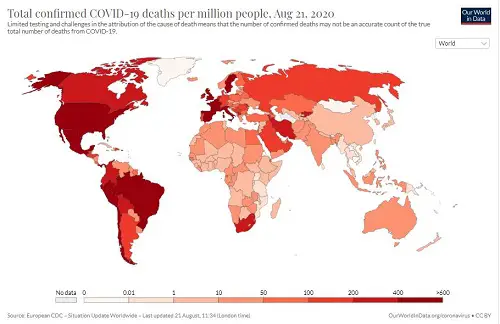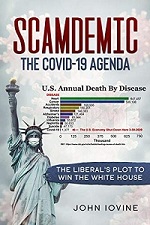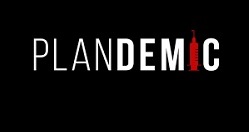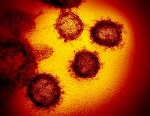|
TRANSLATE THIS ARTICLE
Integral World: Exploring Theories of Everything
An independent forum for a critical discussion of the integral philosophy of Ken Wilber
  Frank Visser, graduated as a psychologist of culture and religion, founded IntegralWorld in 1997. He worked as production manager for various publishing houses and as service manager for various internet companies and lives in Amsterdam. Books: Ken Wilber: Thought as Passion (SUNY, 2003), and The Corona Conspiracy: Combatting Disinformation about the Coronavirus (Kindle, 2020). Frank Visser, graduated as a psychologist of culture and religion, founded IntegralWorld in 1997. He worked as production manager for various publishing houses and as service manager for various internet companies and lives in Amsterdam. Books: Ken Wilber: Thought as Passion (SUNY, 2003), and The Corona Conspiracy: Combatting Disinformation about the Coronavirus (Kindle, 2020). TABLE OF CONTENTS | REVIEWS
Pandemic, Infodemic, Scamdemic, Plandemic?The Corona Conspiracy, Part 14Frank VisserEpidemic/Pandemic
We are drowning in data related to the current coronavirus. Policy makers have to make sense of all this. Who can give us sound judgement?
What is a pandemic? "A pandemic (from Greek πᾶν, pan, "all" and δῆμος, demos, "people") is an epidemic of an infectious disease that has spread across a large region, for instance multiple continents or worldwide, affecting a substantial number of people. A widespread endemic disease with a stable number of infected people is not a pandemic. Widespread endemic diseases with a stable number of infected people such as recurrences of seasonal influenza are generally excluded as they occur simultaneously in large regions of the globe rather than being spread worldwide. Throughout human history, there have been a number of pandemics of diseases such as smallpox and tuberculosis. The most fatal pandemic in recorded history was the Black Death (also known as The Plague), which killed an estimated 75-200 million people in the 14th century. The term was not used yet but was for later pandemics including the 1918 influenza pandemic (Spanish flu). Current pandemics include COVID-19 and HIV/AIDS." (Wikipedia) The COVID-19 disease has spread now to "213 Countries and Territories around the world have reported a total of 23,029,243 confirmed cases of the coronavirus COVID-19 that originated from Wuhan, China, and a death toll of 800,044 deaths." (worldometer.com). It can therefore truly be called a "pandemic". Simply put, an "epidemic" is a disease that affects a given population, or even a country, but when a disease spreads to other continents, and virtually the whole world, we can call it a pandemic. The Covid-19 pandemic poses not only a challenge as a disease to combat but also as a wealth of information to make sense of. People respond to this second challenge in various ways. It is almost impossible for normal people like you and me to find answers to all the questions we may have about the coronavirus. Some therefore can't resist the temptation to turn to people who promise them to tell "what's really going on." More and more people doubt the standard scientific narrative, and emotionallly draw there own conclusions (or "follow their heart") to decide about the nature of this virus. In Part 2 I gave 15 aspects of the science narrative that can be questioned on either dissident-scientific or paranoid-conspiracy grounds:
InfodemicThe pandemic has generated an unprecedented avalanche of medical information. The number of studies on COVID-19 is estimated to be 40.000 by now, with an average of 2200 per week and 320 per day being added. No human being can possibly digest all this information. Yet, Dutch internist-infectiologist Joost Wiersinga working at the Amsterdam Medical Center has attempted to compile such a review. His article was published in the Journal of the American Medical Association on July 10, 2020, and has been viewed over half a million times at the time of this writing (August 21, 2020). It is freely available. Recommend reading![1] We are literally drowning in data related to the current coronavirus. The opinions circus is in full swing. On the one hand we have alarmism and hysteria. On the other hand we see denial and paranoia. Policy makers have to make sense of all this. Who can give us sound judgement? Who finds the right balance between population health, the economy and our general well-being? The WHO has warned against a true "infodemic" in the context of this pandemic: In the context of the COVID-19 pandemic, the phenomenon of an ‘infodemic' has escalated to a level that requires a coordinated response. An infodemic is an overabundance of information—some accurate and some not—occurring during an epidemic. It makes it hard for people to find trustworthy sources and reliable guidance when they need it. Even when people have access to high-quality information, there are still barriers they must overcome to take the recommended action. Like pathogens in epidemics, misinformation spreads further and faster and adds complexity to health emergency response.[2] It is good to see that there's a legitimate and an illegitimate information problem. Wiktionary gives the two meanings, which are also mentioned by the WHO, very succinctly. Both are relevant for our topic: infodemic
There's an analogy to the climate change literature. Here too, we see graph upon graph upon graph supporting this or that conclusion, often very contradictory conclusions at that. There is clearly a consensus among climate scientists, but this consensus is challenged by a handful of "climate skeptics" or "climate change denialists" who can often provide their own data, graphs and conclusions. The poor layman is left in bewilderment in this arena of conflicting arguments. The same is true for the SARS-CoV-2 virus. Even specialized virologists are acutely aware about how little they actually understand of it—not to mention other scientists, let alone ordinary people. At the same time, we seem to have 7 billion virologists by now, for everybody has to make his or her mind up about this worldwide disaster. Heck, I am writing this series not in the last place to make sense of it all myself! We have seen our fair share of virus denialism in this series on the Corona Conspiracy, and we will return to that aspect later in this essay. But I want to stay close to the scientific data first to point to a real problem. What are the key metrics to get a grip on SARS-CoV2 and the disease Covid-19 it has generated? Number of cases? Number of cases per capita? Number of deaths per case? Number of deaths per capita? Number of positive cases per number of tests done? Number of infectious cases per number of positive cases? Can we compare data from different countries when there are few standardized ways of collecting data to allow for meaningful comparisons? 
Total confirmed Covid-19 deaths per million people, August 21, 2020.
Furthermore, are all valid points of view covered in the scientific literature? Or are some views ignored as of now, leading to an incomplete picture of this pandemic and the best ways to tackle it? When does a stubborn focus on partial truths, caused by a bona fide selection of data, turn into willfully ignoring certain facts? Examples can be listed with ease: the usefulness and effect of wearing masks; the role of drops caused by sneezing or coughing versus tiny aerosoles in the spread of the disease; the role played by the invading virus versus the state of the immune system and the impact of comorbidities; the use or uselessness of widespread testing—it seems many fundamental issues haven't been decided upon in the scientific community. But there's a catch: critics of the accepted view of the pandemic usually over-emphasis a particular aspect, which has been neglected according to them, and often defend it with almost religious zeal. But the point of good science is that all points of view are taken into account and a balanced evaluation is based on the widest possible data range. It takes a lifetime of professional work to get to such an overview—and even then scientists might legitimately disagree on certain points. Some critics even claim the current rise in cases is wholly caused by an increase in the number of tests being done. This would result in an artefact or "casedemic". Thing is, the tests used are highly sensitive and are able to spot the tiniest genetic fragment of the virus (see Part 13). It is argued, reasonably I think, that a positive test doesn't automatically mean one is infected and is able to infect others (at the moment of testing). It appears that those who have recovered from Covid-19 still harbor fragments of the virus for weeks, even though these can no longer do harm. This would seriously result in an overestimation of the number of infected people. It is like calling everybody who has taken an IQ test "intelligent", because he has some intelligence; or calling everybody with an income "rich" because he has some amount of money. Of course, this doesn't mean the tests are "scientifically meaningless" or that the virus doesn't exist and we are actually testing for generic genetic material in the human body, as it is claimed by conspiracy theorists. Far from it. As virologist James Hildreth said it so eloquently: "The virus is real. The pandemic is real and is caused by the virus. Period." Tests can find at least traces of this virus in the human body. ScamdemicTurning now from the medical to a more cultural-psychological angle: the extensive news coverage of the pandemic in newspapers, television and social media in the past six months has created a pervasive feeling of fear among the population at large. The obsessively detailed reporting of daily deaths due to Covid-19, which has been customary for months, seems unnecessary, especially now that the numbers seem to be declining wherever some kind of lockdown has been put in place. It is good to realize we are still here within the realm of normalcy. A pandemic of an unknown virus has taken the world by surprise, and the lockdown measures all over the world seem to follow the principle of "safety first". After all, given the potential risk of such a pandemic of a new virus, it is better to error on the side of caution. Feverish and sensational news coverage can certainly have played a role in blowing up this pandemic to unrealistic proportions, and a sober evaluation about the real harmfulness and contagiousness of this virus is certainly called for. 
Some have called this a "scamdemic", a book by that name states: "This book is not stating that the COVID-19 virus isn't a threat, this book exposes the exaggeration and fearmongering of the COVID-19 virus threat to panic the population." Yet, the subtitle "The Liberal's Plot to Win the Whitehouse" betrays a true politicized conspiracy: "After the fake news media panicked the population, state governors capitalized on the weakened psychology to declare a "State of Emergency" that gave them complete authoritarian control to enforce unnecessary socioeconomic lockdowns. These lockdowns are a socialist Democrat's dream. Lockdowns isolated, controlled, and trained people into strict government obedience. Welcome to COVID-1984, the dystopian future we feared has arrived. George Orwell would be proud" (Amazon). Indeed, Covid-19 is often called "Covid-1984" in these circles. Now, I would always wonder why Democrats would go to such lengths to regain political influence. Or why half a million deaths worldwide would be the cost any sane and sensible person would consider legitimate to reach his goals—unless he was the Devil (and for David Icke he is). There's an interesting psychological divide between the collectivists and the individualists, those strongly in favor and those fiercely against a large government. But in the US this has become a veritable culture war, where the cautious and rational stand against the emotional and anarchist souls (see Part 8). The simple wearing of masks in public spaces has become a matter of life and death, even on a par with the Star of David Jews had to wear in WWII. Things have become so delusional in extreme right-wing corners that every Democrat is seen as a potential pedophile (I kid you not). "Save the children" has become their battle cry. 
QAnon looms behind nationwide rallies and viral #SavetheChildren hashtags.
PlandemicBut some people take this one step further. In their paranoid worldview, this whole pandemic has been orchestrated or manufactured, to serve certain sinister goals. This series started with David Icke (see Part 1), who clearly sees evil intent behind the major players in this pandemic, or even the world stage at large. Big Pharma often is here the main culprit, Bill Gates the Devil incarnate. Hasn't Gates explicitly stated as one of his goals that he wants to reduce the population (as if overpopulation isn't one of the most urgent problems we are facing)? In their heated brains Gates is aiming at vaccinating us all and inserting chips in us that will alter our DNA, where in fact he is looking for ways to keep track of vaccinations in a simple way. This paranoid view of the pandemic has been called "plandemic", because the whole phenomenon is seen as a premeditated operation. The documentary by that name Plandemic went viral last May and was watched by millions of people, even though it lasted less than 30 minutes. The video documentary was removed by multiple platforms, including Facebook, YouTube, Vimeo, and Twitter. A sequel called "Plandemic 2: Indoctornation" has just been released last week, on August, 18, 2020, but social media platforms were quick to either ban links to it or mark them as suspect (a link to a Wikipedia page will be added when available). This has the unfortunate consequence of strengthening the conspirationist' persecution complex. In the first video discredited scientist Judy Mikovits featured prominently; in the second video it is Bill Gates who is presented as the arch-villain. Both videos follow essentially an antivaxx agenda. Both have been thoroughly debunked.[3] The grave voice-overs in these documentary tell the story: if the main stream media are scaring you about the pandemic, these conspiracy peeps scare you even more, about a worldwide conspiracy! Who is capitalizing on the fear among the population here?  
Both documentaries are available on bitchute.com (but I won't link to them).
We are here in different territory altogether, and conspiracy thinkers pick and choose freely from science or pseudo-science to support their views. It is difficult to find a coherent story here: some deny the existence of viruses (so the whole pandemic is a fantasy), some see the virus as real but either man-made or as escaped from a lab, some see it as a really harmful virus, as a kind of bioweapon released upon the world. But all of these share a deep distrust of both regular science and the government. The most influential ideology in this area is QAnon, a conspiracy cult movement that has taken hold of quite a number of Republicans in the USA, who see the government as the "Deep State" which is a "swamp" that needs to be "drained". It is funny if it wasn't so dangerous, because millions of people and even GOP senators actually believe these things.[4] You won't find a Democrat in these nether spheres! So we have come a long way from a massively complex pandemic scientists try to make sense of to find a cure, to dissident scientists or laymen that point to neglected facts of science, to a sensationalist media pandemonium that keeps the general population in a state of fear, to finally a grim view of evil powers behind the world scene, trying to poison and enslave us unless we are strong and courageous enough to rebel and reclaim our freedom. Where do you find yourself in this spectrum? As if the pandemic isn't already complex enough as it is. Conspiracy narratives, looking for simple answers, make it harder to understand this complexity. Yes, things are complex, but can we not just keep our heads cool and just stick to the facts? Notes[1] W. Joost Wiersinga et. al., "Pathophysiology, Transmission, Diagnosis, and Treatment of Coronavirus Disease 2019 (COVID-19): A Review", JAMA, Published online July 10, 2020. [2] "1st WHO Infodemiology Conference", who.int, 30 June-16 July 2020. Free PDF brochure. [3] Debunking of Plandemic 1:
[4] Debunking of Plandemic 2:
[4] Brian Stelter, "GOP congressman Adam Kinzinger urges Republican leaders to denounce QAnon", cnn.com, August 16, 2020. Now to take conspiracy to new heights of meta-conspiracy, I now bring you a funny video called "The HIDDEN Agenda Behind Plandemic Indoctorination" by Coffeezilla:
Coffeezilla: “The new problems are better than the old problems, that's the point I am getting at.” (see also his debunk of the London Real David Icke video in Part 4).
83 Vaccine Myths from docbastard.net
To all those who claim SARS-CoV-2—or any virus—does not exist: the virosphere consists of 7 realms
11 kingdoms, 22 phyla, 4 subphyla, 49 classes, 93 orders, 12 suborders, 368 families, 213 subfamilies, 3,769 genera, 86 subgenera, 16,215 species. Take that.
https://talk.ictvonline.org/taxonomy/
A summary of early parts of this series has appeared in the Dutch magazine Skepter 33(3), September 2020, as "Viruses don't exist" (covering Parts 1-5). German: Skeptiker (December 2020); English: Skeptic.org.uk (January 2021)
Comment Form is loading comments...
|
 The coronavirus:
The coronavirus: